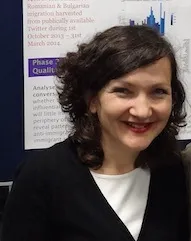Project overview
This research examined the role of gender in the relationship between migration – especially international migration – and development, with specific relevance to remittances.
In recent years, migration has played an increasingly prominent role in the international debate on development. A key role in this new debate on migration and development (or ‘the migration–development nexus’) is played by remittances. But remittances are overwhelmingly seen in economic and financial terms. Although gender plays a fundamental role in the mechanics of remitting, remittances are almost never analysed through a gendered perspective.
Funded by the UN-INSTRAW (United Nations International Research and Training Institute for the Advancement of Women) as part of a multi-country project, the research studied migration and the gendering of remittances in a small rural cluster of Southeast Albania, and related migration networks to the neighbouring Greek city of Thessaloniki. A mixed methods approach was adopted including a questionnaire survey of 350 remittance-receiving rural households in Albania, and 45 seminar-structured in-depth interviews with some of these families, migrants in Greece, and return migrants. A number of roundtable discussions were organised with academics, local, regional and national level policymakers, government representatives, representatives of migrant organisations and INGOs, and money transfer companies, in both Albania and Greece, to stimulate discussions around the gendering of remittances and its connection to local and national development.
In recent years, migration has played an increasingly prominent role in the international debate on development. A key role in this new debate on migration and development (or ‘the migration–development nexus’) is played by remittances. But remittances are overwhelmingly seen in economic and financial terms. Although gender plays a fundamental role in the mechanics of remitting, remittances are almost never analysed through a gendered perspective.
Funded by the UN-INSTRAW (United Nations International Research and Training Institute for the Advancement of Women) as part of a multi-country project, the research studied migration and the gendering of remittances in a small rural cluster of Southeast Albania, and related migration networks to the neighbouring Greek city of Thessaloniki. A mixed methods approach was adopted including a questionnaire survey of 350 remittance-receiving rural households in Albania, and 45 seminar-structured in-depth interviews with some of these families, migrants in Greece, and return migrants. A number of roundtable discussions were organised with academics, local, regional and national level policymakers, government representatives, representatives of migrant organisations and INGOs, and money transfer companies, in both Albania and Greece, to stimulate discussions around the gendering of remittances and its connection to local and national development.
Staff
Other researchers
Collaborating research institutes, centres and groups
Research outputs
Julie Vullnetari & Russell King,
2016
Type: bookChapter
Julie Vullnetari & Russell King,
2016, Gender, Place & Culture, 23(2), 198-215
Type: article
Russell King, Eralba Cela, Tineke Fokkema & Julie Vullnetari,
2014, Population, Space and Place, 20(8), 728-738
DOI: 10.1002/psp.1895
Type: article
Julie Vullnetari & Russell King,
2014
Type: bookChapter
Russell King & Julie Vullnetari,
2013
Type: workingPaper
Russell King, Diana Mata-Codesal & Julie Vullnetari,
2013, Comparative Migration Studies, 1(1), 69-96
Type: article
Julie Vullnetari,
2012, Journal of Ethnic and Migration Studies, 38(8), 1305-1325
Type: article
